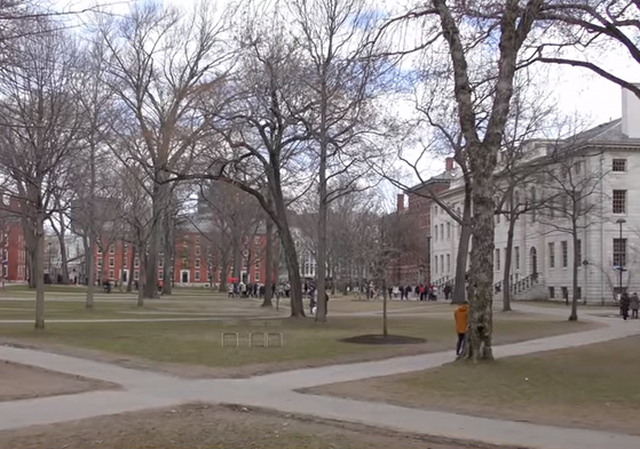Harvard Ends Policy That Penalized Students for Belonging to Single-Sex Clubs
“In essence, [Gorton] accepted the plaintiffs’ legal theory that the policy, although adopted to counteract discrimination based on sex, is itself an instance of discrimination based on sex,”

Back in 2016, Harvard essentially banned membership in single-sex clubs for students. They enforced this policy by barring non-compliant students from leadership positions in sports and other campus activities, and by restricting access to certain scholarships.
The school has now ended the policy.
Of all the wrong-headed policies on college campuses, this one was especially baffling. It limited choices for students and gave them no credit for being capable of making their own decisions.
Like so many situations in higher education, this came down to legal matters.
The FIRE blog reports:
Bye-bye blacklist: Harvard ends attack on single-sex groups
Four years ago, Harvard University announced a stunning attack on freedom of association when it blacklisted members of independent, single-sex, off-campus organizations from certain scholarships and campus leadership opportunities. Now, after legal setbacks and years of intense public criticism, the blacklist is no more.
Yesterday, Harvard President Lawrence Bacow announced to the Harvard community that the university will abandon the policy due to the “prevailing interpretation of federal law.” Last year, a federal judge ruled that a lawsuit brought against Harvard by fraternities and sororities could proceed with claims that the blacklist policy discriminated based on sex. Bacow said Harvard would also be withdrawing the policy in light of the “significant implications” from the Supreme Court’s decision earlier this month in Bostock v. Clayton County.
“Harvard’s effort to crush one of America’s most fundamental freedoms for its students failed in the court of public opinion and was failing in the court of law,” said FIRE Executive Director Robert Shibley. “Harvard squandered time, resources, and most of all its credibility defending its indefensible blacklist policy. While this ‘Crimson Scare’ is finally over, lasting damage has been done to many cherished men’s and women’s groups that either shut down or were muscled into changing their policies against their wishes.”
Harvard’s blacklist policy, ostensibly enacted to foster “inclusion” and “address deeply rooted gender issues,” in reality gutted students’ right to free association. Students found to have joined a single-sex social organization were forbidden from receiving Harvard Fellowships as well as Rhodes and Marshall scholarships, and banned from attaining leadership positions in recognized campus organizations or on athletic teams.
The Harvard Crimson provides further details:
Harvard has dropped its social group sanctions as a result of a recent Supreme Court decision on sex discrimination, University President Lawrence S. Bacow wrote in an email Monday afternoon.
In 2016, the College announced a set of sanctions against members of final clubs and single-gender Greek organizations, precluding students in those groups from receiving fellowships, athletics captaincies, and leadership positions in extracurricular groups. First applied to the Class of 2021, the sanctions received intense scrutiny and spawned a pair of lawsuits in state court and federal court…
Bacow wrote in his email that, after the Court announced its decision, the Harvard Corporation recognized that its reasoning might have significant implications for the social group policy based on United States District Judge Nathaniel M. Gorton’s legal reasoning in his decision to deny Harvard’s motion to dismiss the suit in August 2019.
“In essence, [Gorton] accepted the plaintiffs’ legal theory that the policy, although adopted to counteract discrimination based on sex, is itself an instance of discrimination based on sex,” Bacow wrote. “It now seems clear that Judge Gorton would ultimately grant judgment in the plaintiffs’ favor in the pending lawsuit and that Harvard would be legally barred from further enforcing the policy.”
College students should have freedom of association, but perhaps more importantly, they should be treated like adults.
 DONATE
DONATE
Donations tax deductible
to the full extent allowed by law.








Comments
I like the end result, but I’m not sure that I understand the logic of the argument. Some of these Woke things, I must admit, are over my head.
The logic is very simple. John is banned from the Rhodes Scholarship because he’s a member of the Boston Band of Brothers. Had he been female he would not have been banned for such membership. Therefore banning him is sex discrimination. If you follow the logic of Bostock a little further up the path, you reach this conclusion.
I can’t believe thefire.org is so racist as to use the term *gasp* blacklist. I need to go to my safe space now.
“”they should be treated like adults.””
First, they should start acting like adults.
The Pro-Choice religion dictates restoration of single-sex clubs for the politically congruent homosexual elite in the transgender spectrum. It didn’t help the Boy Scouts or the Catholic Church, who are being sued for what is apparently early adoption of political congruence (“=”) under the State-established Progressive Church with a Pro-Choice, selective, opportunistic religion. Female chauvinists… feminists will enjoy a progressive future as they are no longer politically congruent. Well, other than Planned Parenthood, including selective-child to keep women barefoot, available, and taxalbe, and cannibalized-child for medical progress.
Can someone comment on the potential for lawsuits by students who were blacklisted and denied opportunities for scholarships/fellowships? Their hand has been strengthened by SCOTUS and the university’s change of heart can be presented as a tacit admission that it was on the wrong side of the law. Seems like it might be low-hanging fruit (except the fruit has a lot of money on its side).